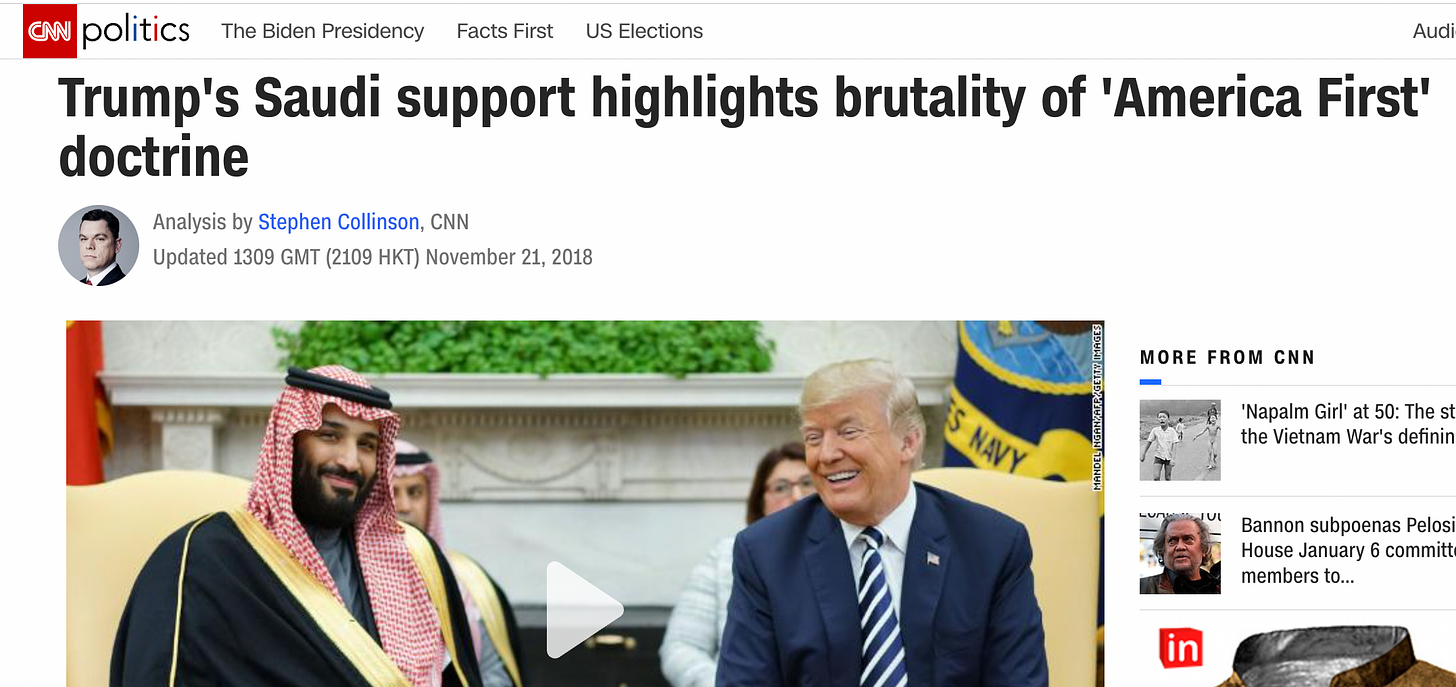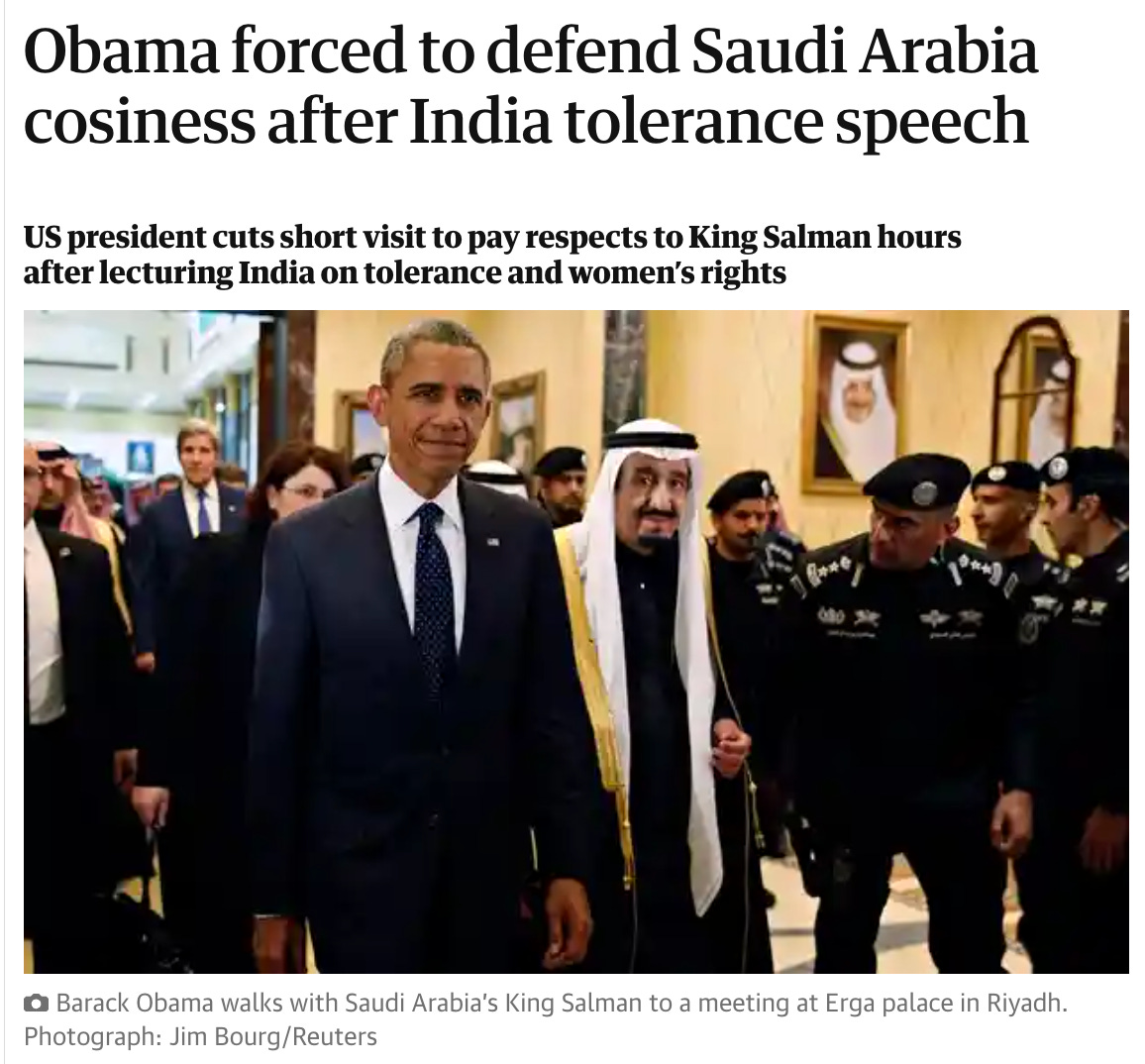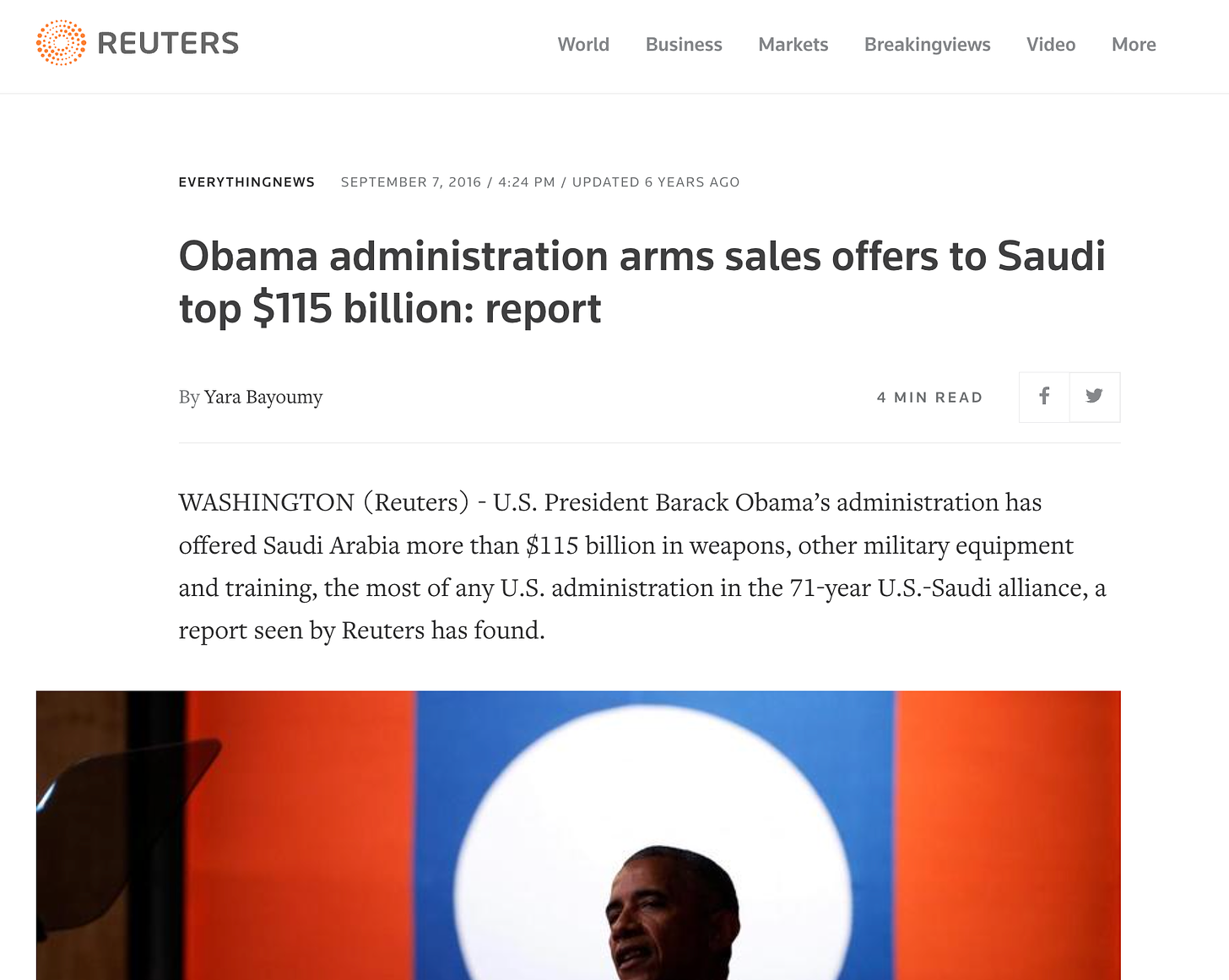![]()

by Glenn Greenwald
In 2018, President Trump issued a statement reaffirming the U.S.’s long-standing relationship with the Saudi royal family on the ground that this partnership serves America’s “national interests.” Trump specifically cited the fact that “Saudi Arabia is the largest oil producing nation in the world” and has purchased hundreds of billions of dollars worth of weapons from U.S. arms manufacturers. Trump’s statement was issued in the wake of widespread demands in Washington that Trump reduce or even sever ties with the Saudi regime due to the likely role played by its Crown Prince, Mohammed bin Salman, in the brutal murder of Washington Post columnist Jamal Khashoggi.
What made these Trump-era demands somewhat odd was that the Khashoggi murder was not exactly the first time the Saudi regime violated human rights and committed atrocities of virtually every type. For decades, the arbitrary imprisonment and murder of Saudi dissidents, journalists, and activists have been commonplace, to say nothing of the U.S./UK-supported devastation of Yemen which began during the Obama years. All of that took place as American presidents in the post-World War II order made the deep and close partnership between Washington and the tyrants of Riyadh a staple of U.S. policy in the Middle East.
Yet, as was typical for the Trump years, political and media commentators treated Trump’s decision to maintain relations with the Saudis as if it were some unprecedented aberration of evil which he alone pioneered — some radical departure of long-standing, bipartisan American values — rather than what it was: namely, the continuation of standard bipartisan U.S. policy for decades. In an indignant editorial following Trump’s statement, The New York Times exclaimed that Trump was making the world “more [dangerous] by emboldening despots in Saudi Arabia and elsewhere,” specifically blaming “Mr. Trump’s view that all relationships are transactional, and that moral or human rights considerations must be sacrificed to a primitive understanding of American national interests.”
The life-long Eurocrat, former Swedish Prime Minister Carl Bildt, lamented what he described as Trump’s worldview: “if you buy US weapons and if you are against Iran – then you can kill and repress as much as you want.” CNN published an analysis by the network’s White House reporter Stephen Collinson— under the headline: “Trump’s Saudi support highlights brutality of ‘America First’ doctrine” — which thundered: “Refusing to break with Saudi strongman Mohammed bin Salman over the killing in the Saudi consulate in Istanbul, Trump effectively told global despots that if they side with him, Washington will turn a blind eye to actions that infringe traditional US values.” Trump’s willingness to do business with the Saudis, argued Collinson, “represented another blow to the international rule of law and global accountability, concepts Trump has shown little desire to enforce in nearly two years in office.”
Perhaps the most vocal critic of Trump’s ongoing willingness to maintain ties with the Saudi regime were then-Democratic presidential candidates Joe Biden and Kamala Harris. As a recent CNN compilation of those statements demonstrates: “In the years prior to taking office, President Joe Biden, Vice President Kamala Harris, and many of their administration’s top officials harshly criticized President Donald Trump’s lack of action against Saudi Arabia and Crown Prince Mohammed bin Salman for the 2018 murder of Saudi journalist and Washington Post columnist Jamal Khashoggi.”
In a 2019 Democratic primary debate, Biden vowed: “We were going to in fact make them pay the price, and make them in fact the pariah that they are,” adding that there is “very little social redeeming value in the present government in Saudi Arabia.” Harris similarly scolded Trump for his ongoing relationship with the Saudis, complaining on Twitter in October, 2019, that “Trump has yet to hold Saudi officials accountable,” adding: “Unacceptable—America must make it clear that violence toward critics and the press won’t be tolerated.”
That Joe Biden was masquerading as some sort of human rights crusader who would sever ties with the despotic regimes that have long been among America’s most cherished partners was inherently preposterous. As Obama’s Vice President, Biden was central to that administration’s foreign policy which was driven by an embrace of the world’s most barbaric tyrants. So devoted was Obama to the U.S.’s long-standing partnership with Riyadh that, in 2015, he deeply offended India — the world’s largest democracy — by abruptly cutting short his visit to that country in order to fly to Saudi Arabia, along with leaders of both U.S. political parties, to pay homage to Saudi King Salman upon his death. Adding insult to injury, Obama, as The Guardian put it, boarded his plane to Riyadh “just hours after lecturing India on religious tolerance and women’s rights.”
The unstinting support of the Saudi regime by the Obama/Biden White House was not limited to obsequious gestures such as these. Their devotion to strengthening the despotic Saudi ruling family was far more substantial — and deadly. Obama’s administration played a vital role in empowering the Saudi attack on Yemen, which created the world’s worst humanitarian crisis: far worse than what has been taking place in Ukraine since the Russian invasion on February 24. In order to assuage the Saudis over his Iran deal, “Obama’s administration has offered Saudi Arabia more than $115 billion in weapons, other military equipment and training, the most of any U.S. administration in the 71-year U.S.-Saudi alliance,” reported Reuters in late 2016, just months before Obama and Biden left office.
Beyond the enormous cache of sophisticated weapons Obama/Biden transferred to the Saudis to use against Yemen and anyone else they decided to target, the Snowden archive revealed that Obama ordered significant increases in the amount and type of intelligence technologies and raw intelligence provided by the NSA to the Saudi regime. That intelligence was — and is — used by Saudi autocrats not only to identify Yemeni bombing targets but also to subject its own domestic population to rigid, virtually ubiquitous, surveillance: a regime of monitoring used to brutally suppress any dissent or opposition to the Saudi regime.
In sum, no hyperbole is required to observe that the Obama/Biden White House — along with their junior British counterparts — was singularly responsible for the ability of the Saudi regime to survive and to wage this devastating war in Yemen. But that is nothing new. The centerpiece of U.S. policy in the Middle East for decades has been to prop up Saudi despots with weapons and diplomatic protection in exchange for the Saudis serving U.S. interests with their oil supply and ensuring the use of the American dollar as the reserve currency on the oil market.
That is what made the hysterical reaction to Trump’s reaffirmation of that relationship so nonsensical and deliberately deceitful. Trump was not wildly deviating from U.S. policy by embracing Saudi tyrants but simply continuing long-standing U.S. policy of embracing all sorts of savage despots all over the world whenever doing so advanced U.S. interests. Indeed, what angered the permanent ruling class in Washington was not Trump’s policy of embracing the ruling Saudi monarchs, but rather his honesty and candor about why he was doing so. American presidents are not supposed to admit explicitly that they are overlooking the human rights abuses of their allies due to the benefits that relationship provides, even though that amoral, self-interested approach is and for decades has been exactly the foundational ideological premise of the bipartisan U.S. foreign policy class.
But this has been the core propagandistic framework employed by the DC ruling class since Trump was inaugurated. They routinely depicted him as an unprecedentedly monstrous figure who has vandalized American values in ways that would have been unthinkable for prior American presidents when, in fact, he was doing nothing more than affirming decades-old policy, albeit with greater candor, without the obfuscating mask used by American presidents to deceive the public about how Washington functions.
Beyond the Saudi example, this same manipulative media scam could be seen most vividly when Trump welcomed the brutal Egyptian dictator Abdel Fattah el-Sisi to the White House. As I reported at the time, the mainstream Washington commentariat depicted Trump’s meeting with and praise for the Egyptian strongman as some sort of shocking violation of bedrock American principles.





Meh. In the words of Ilhan Omar, “some people did something.”
But, fully embracing China and kissing their COVID, torturing, murdering asses is OK. Business is business, after all. Muslims kind of have a reputation for brutality, cruelty and violence. Why doesn’t idiot Biden just write it off as their “culture”, as he did China’s brutality towards the Uyghurs?
Of course, he wouldn’t have had to if he hadn’t destroyed our own energy independence and intentionally made us dependent on foreign, hostile oil. Nothing can describe this short-sightedness but absolute stupidity.
The same crap you pitched with Obama, yet you ignore Trump’s pro-Saudi bullshit entirely: The top 11 favors the Trump administration has done for Saudi Arabia
Remember when you used to scream “Obama is not president anymore” demanding we stop putting the blame on Obama when he deserved it?
Guess you changed your mind on that principal just like you changed your mind on Russia invading Ukraine.
Do you wear your red clown nose out in public?
SA is now part of a group of nations forming that oppose the US and our failing allies in Europe.
They have the leverage on Biden and are using it.
You need to remove your hypocrisy filtering glasses. The point here is that Trump was no more accommodating to Saudi Arabia than any other President has been. Yet, you go right ahead and present an article that reinforces the other point made in the article, that the leftist, Democrat-propping media attacked Trump for doing nothing more than, say, Obama did.
But none of them denounced Saudi Arabia to the point idiot Biden and whore Kamala have and now, due to idiot Biden’s disastrous policies, now have to go kiss their sandy asses to try and save Democrats from being wiped out this coming November.
The cake is already baked for November. The cheating structure they have used in the past will not stop the oncoming red tsunami in November. Should they implement some alternative method of fraud, no intelligent American will believe the American people would want to keep the current political landscape as status quo.
joe says whatever his puppet master whispers into his earpiece…..
https://www.dailymail.co.uk/news/article-10910319/Joe-Biden-decided-visit-Saudi-Arabia-beg-saying-going-second-later.html
Joe Biden told reporters that he hadn’t decided whether to visit Saudi Arabia to beg for more oil before seconds later saying he was indeed planning to go there.
Totally diagnosed dementia patient
All presidents embrace Saudi despots. I wish it would stop.
Joe Biden Downplays Inflation – Then Starts Screaming: “I Don’t Wanna Hear Anymore of These Lies About Reckless Spending!” (VIDEO)
He’s losing it. What did anyone expect?
Maybe he’ll be offering the Saudis a choice between throwing in with the West, which will pay them for their oil, or throwing in with Russia, which won’t. Russia is their competition, selling the only item of consequence that the Saudi’s have to sell. The Saudis may be bastards, but they’re also businessmen. They can be counted on to act in their own best interest.
Wrong.
We had the Saudis in a position to control them
Now we do not. Like everything else wrong with the Biden occupation, we’ve given the Saudis a reason and ability to take their revenge on us.
“Their best interest” is to join with the new Russia/China pact.
Reminder: Russia is winning in Ukraine and you gutless cowards are going to finally say as much as your handlers change your orders. It’s already happening.
Russia is their competition? WE are their competition, you idiot.
Biden has stopped giving licenses for drilling. We don’t make more than we did under Trump. Biden is lying on purpose: the leases applied for under Trump are now getting licenses, so Biden is playing it like HE did that. He didn’t.
We have to make our own oil, and control the field. We aren’t because Euro-Trash have bought our politicians and installed a puppet into our WH, thus playing games that Putin smashed when he invaded Ukraine.
The US needs to pump it’s own oil, cut ties with NATO, and oust the dictator installed in our WH via rigged election.
Of course Russia is their competitor. The Saudis are in a position to supply Europe with the oil that Russia doesn’t—or to have their European market share diminished to the extent that Russia does. The Saudis’ dependence on oil revenue is far greater than our own.
Do you have any clue how many active drilling leases the US oil industry is already sitting on, doing nothing with?
Do you have any clue how much US oil corporation profits have increased while you’re yapping at Biden about your gasoline prices?
Educate yourself before you call others idiots. Otherwise you only look like one yourself.
Do you? Or do you just have the left’s propaganda talking points that have no foundation in reality?
So the US was pumping oil more oil when TRUMP was President. Biden came in and IMMEDIATELY began to dismantle that. No new leases, shutting down pipeline construction and pressuring banks not to loan to oil producers just for starters.
Lefties cheered. So now anti-oil Biden has stuck up with high prices, blaming everyone else. The word has gone out talk about unused leases. Right on cue there you mention it.
So why weren’t oil prices this high when TRUMP was president? Didn’t oil companies want to make record profits then? Oil prices actually dropped under TRUMP and our economy thrived. Since profits aren’t guaranteed you make them when you can. Guess who makes more on a gallon of gasoline, oil companies or the federal government? The feds. What exactly did the government do to bring the product to market?
Even today left wing groups are pushing to shut down another pipeline. The Dakota access pipeline. If they succeed prices will skyrocket from here. Does Biden support this? You? Or hasn’t the word come down yet on what your position should be?
Oh just for hypocrisy’s sake look at what our environmental last president is up to.
https://dailycallernewsfoundation.org/2022/06/15/gas-for-me-but-not-for-thee-obama-to-install-massive-propane-tanks-in-new-england-mansion/
Where’s all the solar panels and wind turbines? His place should be bristling with them.
https://twitter.com/bonchieredstate/status/1537103926859800576?s=20&t=DTyOl883ZT1uB4z9nSUQkg
This is becoming beyond ridiculous.
Energy producers no longer have confidence in the biden regime. The biden regime is attempting to demonize energy producers because of their own feckless policies.
This is intentional because to think it incompetence would require one to have no intelligence
Well, idiot Biden finally admitted it out loud. His little love letter to the energy producers, blaming them for high prices, he told them it is their “patriotic duty” to produce more, despite the federal attacks on them, the lack of investment capital and the lack of additional refining capacity.
So, that means that the stupid idiot Biden shutting down the Keystone and shutting oil companies out of federal leases, regulating refineries into shutting down and restricting investment capital for exploration is UNpatriotic, i.e., ANTI-AMERICAN.
Do you think the Saudis, just because they have dark skin, are STUPID and don’t see the vulnerability idiot Biden has created all by himself? They are MASTER NEGOTIATORS and idiot Biden is a moron.